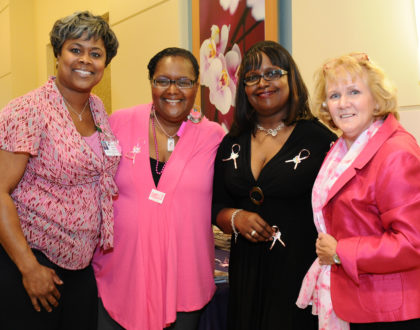Breast Cancer Awareness Month: Know your risk.

Breast Cancer Awareness Month holds a personal significance to me; like so many people, I have family members who battled breast cancer.
When I was nine years old, my mom was diagnosed with breast cancer, and shortly after that, my grandmother was as well. I remember feeling confused but not scared; cancer wasn’t something I could fully comprehend at such a young age. After years of appointments and various types of treatment methods, we were the lucky ones; my grandmother lived until 98 years old, and I give her superwoman caregiver, my mom, so much credit for it. They both battled breast cancer and they both survived.
This isn’t everyone’s reality. Women of color are particularly at risk; while more white women than Black women are diagnosed with breast cancer, Black women have a higher mortality rate from breast cancer. Breast cancer is the most common cause of death from cancer among Latina women and breast cancer is the most commonly diagnosed cancer among Asian American women. While the risk of breast cancer in trans people is not well known, according to Fenway Health, transgender women who have taken hormones and transgender men taking testosterone may be at an increased risk of breast cancer. Learning about your risk is important; finding breast cancer early increases the chances of treating it successfully. The best way to learn about your risk is to review the risk factors and have a conversation with your doctor.
You may have risks that you cannot change but are important to be aware of, such as your family history of breast cancer, getting older, inheriting certain genes, such as BRCA1 and BRCA2, having dense breasts, beginning your menstrual cycle early and starting menopause after age 55. Other risk factors include being overweight or obese after menopause, not being physically active, drinking more than one alcoholic drink per day, and using hormone replacement therapy. It’s important to note that just because you may have one or some of the risk factors does not mean you will develop breast cancer; most women have some risk factors and do not get breast cancer. You can learn more about the risk factors for breast cancer on the Centers for Disease Control website.
You may have noticed that the guidelines around breast cancer screening have changed, which can bring up confusion about when you should get screened, and how often. YW Boston recommends that you review risk factors for breast cancer and talk to your doctor about your personal risk. This conversation can begin at age 40, even if after your conversation you end up waiting until age 45 to get a mammogram. Be sure to share how much physical activity you get, how much alcohol you consume, and what your diet consists of with your doctor. You and your doctor will determine what age is right for you to begin getting your mammogram, and how often you should be screened. View a useful Breast Cancer Screening Chart for women from the Centers for Disease Control and Prevention.
There are many things we can do to reduce our risk for breast cancer:
- Exercise regularly. Did you know that even though most evidence points to the benefits of exercising in premenopausal and postmenopausal women, high levels of moderate and vigorous exercise during adolescence can be especially protective?
- Keep a healthy weight for your body. Did you know that gaining weight after menopause increases your risk for breast cancer? Before menopause, your ovaries make most of the estrogen in your body. After menopause, when ovaries stop making estrogen, the estrogen comes from fat tissue. The more fat tissue, the greater levels of estrogen in the body, which increases risk for breast cancer.
- Limit alcohol intake. Did you know that alcohol increases levels of estrogen in the body, and weakens the body’s ability to break down and absorb many important nutrients, including folate, vitamin A, vitamin C, vitamin D and vitamin E?
- Avoid exposure to chemicals that cause cancer (carcinogens). Did you know that things we use or are exposed to everyday, such as furniture, cleaning products, plastic dishes and even certain foods may contain harmful chemicals that spread into our environment and in our bodies?
- Ask your doctor, if you are taking or have been told to take hormone replacement therapy or oral contraceptives, about the risks to determine if it is right for you. Did you know that women who took estrogen and progestin were more likely to be diagnosed with breast cancer? Learn more about the benefits of hormone replacement therapy and the alternatives to hormone replacement therapy.
- Eat nutritious food. Did you know that you can reduce your risk for breast cancer by adding more fruits and veggies to your diet?
- If you smoke, start thinking about how to quit. Did you know that women who started smoking before their first menstrual cycle have a 61% higher risk of developing breast cancer than those who started smoking after their menstrual cycle? Learn more about the connection between smoking and breast cancer risk, and get resources on how to quit smoking.
- Learn about your personal risk. You can learn about your personal risk by getting to know your body, noticing any changes, learning about your family history when possible, and sharing this information with your doctor. This will help the two of you determine what your personal risk is for being diagnosed with breast cancer. Did you know that being a woman is the biggest risk factor for developing breast cancer? Did you know that men are also diagnosed with breast cancer? Learn more about breast cancer in men.
